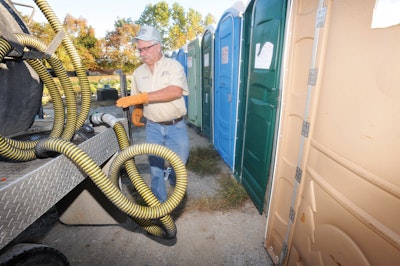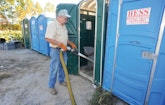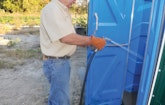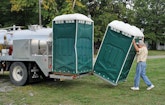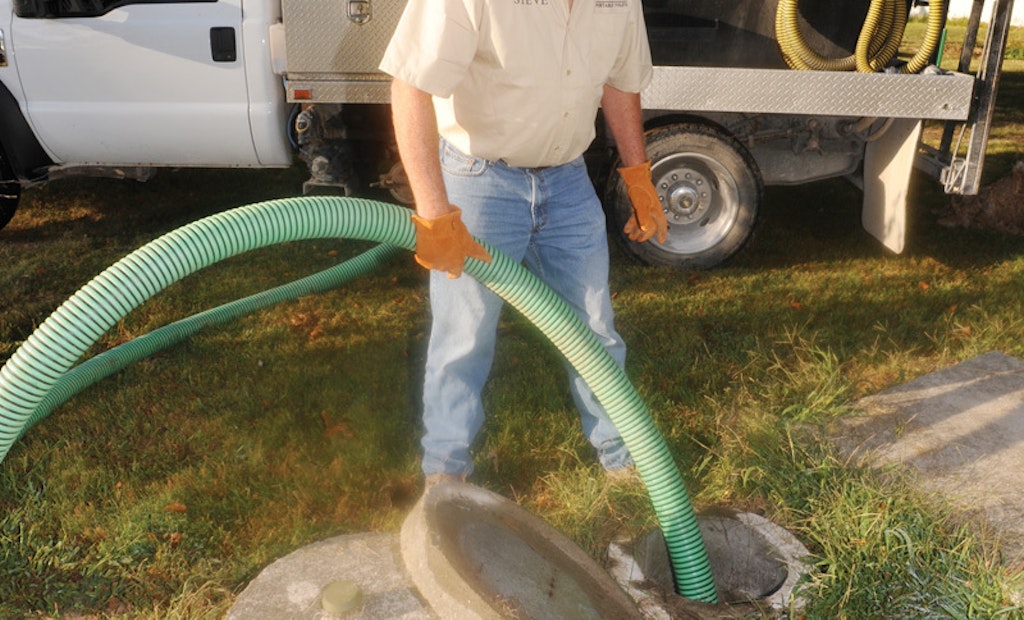Interested in Portable Sanitation?
Get Portable Sanitation articles, news and videos right in your inbox! Sign up now.
Portable Sanitation + Get AlertsWhen a freakish storm packing hurricane-force winds and heavy rain smacked southern Illinois in May 2009, toppling trees and creating massive power outages, Steve Hess did what he does best: swung into action and soldiered on to serve customers — in this case, emergency work crews.
The owner of Hess Portable Toilet Rental in Cambria, Ill., delivered 70 portable restrooms and 35 hand-wash stations to a large retail-store parking lot in nearby Marion and serviced them twice a day. After one week, he moved 20 of those units and 10 hand-wash stations to a mall parking lot in nearby Carbondale. He kept up this schedule for about two weeks as crews dealt with the wreckage.
The only bright spot: Closed roads barred him from completing his normal routes, which left him enough time to service the emergency restrooms set up for the hundreds of rescue workers that inundated the area.
“I put out just about everything I had with a good door on it,” Hess says. “For the first few days it was horrible just getting to Marion and back because so many roads were closed because of fallen trees, overturned cars and downed electrical wires. It was a nightmare. Nobody could get around for about two days … we had winds over 100 miles per hour and a lot of rain.
“One of the biggest challenges was keeping the hand sanitizers going,” he recalls. “With so many workers coming in from out of town, everyone was so afraid of the swine flu (going around at the time), so I had to buy about 35 hand-wash stations.
“But I was glad we could help. It felt like we were part of the recovery. You had to be there to understand why I feel that way.”
LOOKING FOR TURNED DIRT
Hess worked for a waste-hauling company for 26 years, since he was in high school. Then he landed contracts to clean campgrounds until 1999, when he bought out an existing small portable restroom business. The business grew slowly but steadily, thanks to a solid base of existing routes, word-of-mouth referrals and a close watch for new construction projects.
“We keep an eye out for dirt being turned over,” Hess says. “We cover a lot of ground every day and see a lot of things going on … I believe that’s the best way of doing it.”
One of Hess’ most effective marketing techniques is inexpensive and low-tech: decals on his restrooms. He’s found many construction companies call because they see decals with phone numbers on restrooms at existing construction sites. He says he pays $4 to $5 each for an 8-by-10-inch decal sign, bought from a local sign maker, on which he includes both his local phone number and a toll-free number for out-of-town construction companies looking for local restroom service. “A lot of construction companies that work around here come from out of town,” he notes.
Today, restroom rentals generate about 80 percent of the company’s revenue, with septic service driving the balance. On the restroom end of the business, construction rentals provide about 80 percent of the volume, with special events contributing the balance, Hess says.
Hess started pumping septic tanks less than a year ago. He decided to branch out and diversify his business after receiving repeated phone calls — including many from his restroom customers — asking for the service. He uses a 2009 International DT466 with a 1,000-gallon waste/350-gallon freshwater stainless-steel tank, built by Best Enterprises Inc., to pump both septic tanks and service restrooms.
Hess says he didn’t need any special certification or licensing to start pumping septic tanks because in Illinois, the same license covers both portable sanitation and septic services.
IN THE YARD
To serve his customers, Hess owns 400 restrooms, about half of them made by T.S.F Co. Inc. and the other half manufactured by PolyPortables Inc.; 35 double hand-wash stations from T.S.F.; and 35 plastic, 300-gallon holding tanks, also made by T.S.F. and used mostly in tandem with portable office trailers on construction sites. (The trailers are owned or rented by construction companies and include a restroom located in the middle, between two offices).
The company also runs a 1999 GMC with a 750-gallon waste/200-gallon freshwater steel tank made by Lane’s Vacuum Tank Inc. and a 1994 International DT466 with a 1,000-gallon waste/300-gallon freshwater steel tank, made by T.S.F.
Hess prefers trucks on the larger side for portable sanitation routes because greater capacity means reduced transportation costs to the treatment plant and improved productivity. He also believes larger trucks are more durable, a huge factor as his service rigs can gobble up miles quickly; his International truck, for example, racked up 20,000 miles after just four months of work.
“I no sooner buy a truck and it seems like it has 50,000 miles on it,” he says.
Hess is considering buying an even larger used truck, thanks to a recent 100 percent increase in disposal fees, from $25 to $50 per load, regardless of load size. With that increase, he believes it will be more economical to buy a truck with a 3,000-gallon tank to consolidate several smaller loads for less-frequent trips to the dump.
“What I pay (in disposal fees) over the course of a year would just about equal the price of a used truck with a 3,000-gallon tank,” he says.
SERVICE CAN STAND OUT
Hess says he has three major competitors, so providing top-notch customer service is critical to retaining existing accounts and obtaining referrals for new ones. He uses high-pressure power washers that are attached to his trucks, as well as a wash-down chemical and a spray deodorizer, both made by J & J Chemical Company Inc.
“I try to keep prices fair, as best I can, and provide really clean restrooms and really good weekly service,” he says. “That makes a big difference. I don’t know that I do anything different than any other guy, but I retain customers through quality of service.”
Hess says he puts in about 55 to 60 hours a week, and another driver puts in 40 to 45 hours a week. In summer, he hires another full-time driver, who helps handle regular service routes while Hess attends to special events.
“It’s just a matter of keeping them all going — that’s what it’s all about,” he says. “We’re a small operation, but we do a lot of work. I take a lot of pride in doing so much work with so few people.”
It appears that things will only get busier in the years ahead, as the company just won a five-year contract to rent 114 restrooms on a dam-construction site where crews will work around the clock, seven days a week. The restrooms will be located throughout a 20-acre site and will require cleaning three times a week.
When asked how he’ll handle that with his existing staff, Hess says it’ll work out fine. “I’m tough — I push myself,” he says. “We cover a lot of territory in a good amount of time with our two trucks (the third truck serves only as a backup). I’m really excited about this job.”
STAYING ON THE FRONT LINES
Hess says he’d rather work more and be sure a job is done right than hire more employees. Also, he’s found it difficult to find quality workers to help him out.
“You have to put your heart into it and enjoy this work, which I really do,” he says. “I find it very rewarding to deal with customers one-on-one and make them happy. It’s an honest way to make a living. And if you can’t take pride in what you do, then you don’t belong out here. It’s that simple.”
